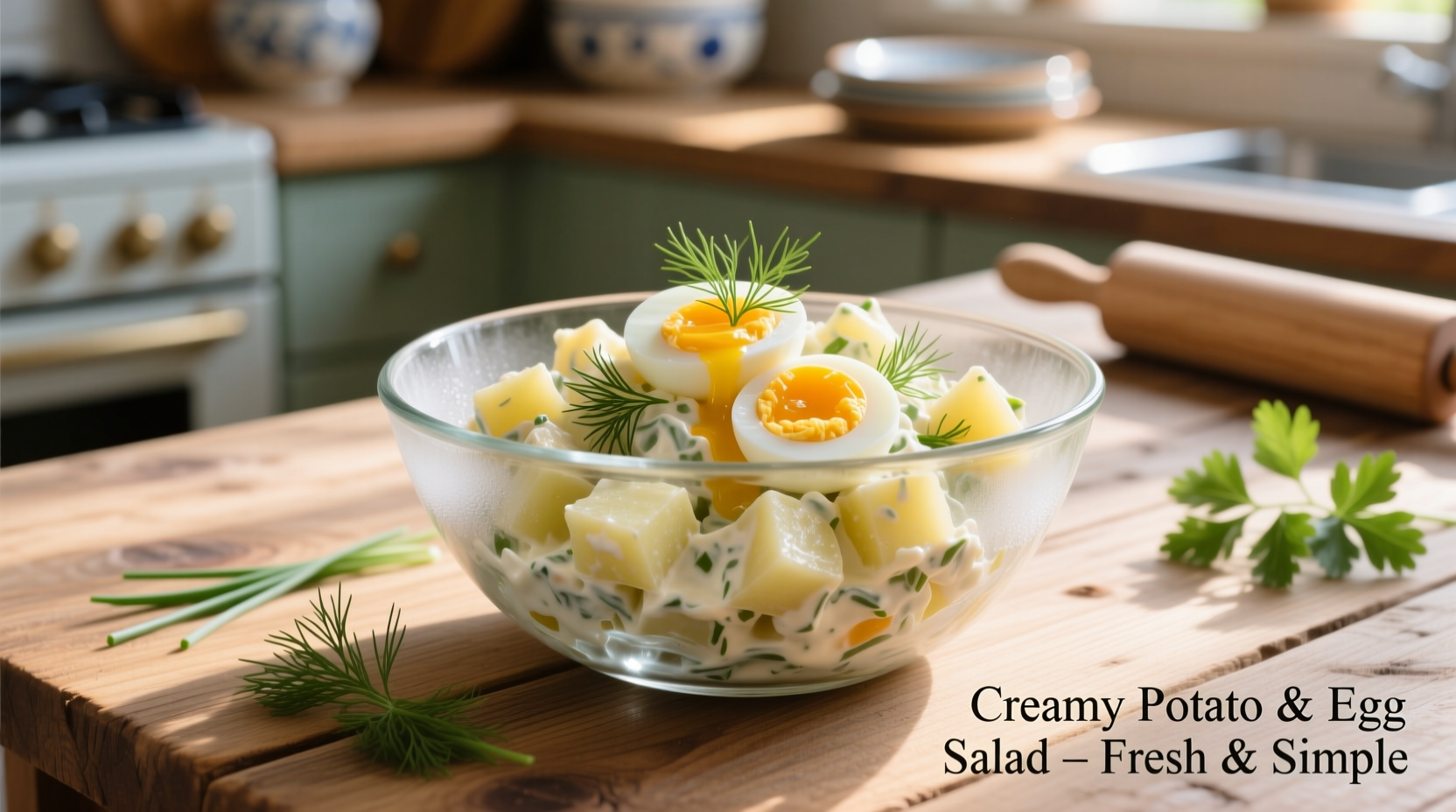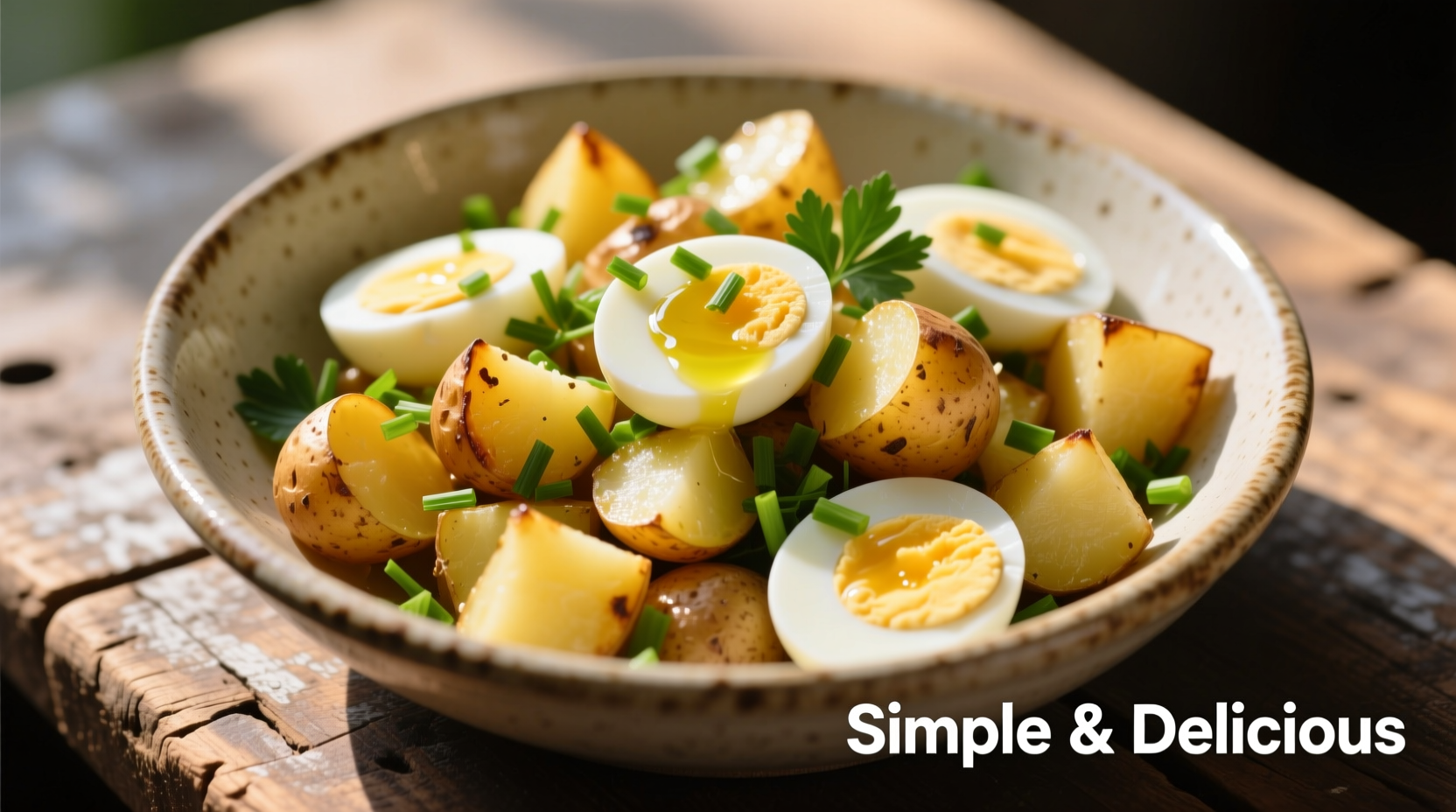If you're looking for a classic potato and egg salad recipe that's creamy, flavorful, and perfect for picnics or potlucks, you've found it. This traditional combination delivers a satisfying balance of tender potatoes, perfectly cooked eggs, and a creamy dressing that holds up well at room temperature. The ideal potato and egg salad features waxy potatoes like Yukon Gold, hard-boiled eggs cut into uniform pieces, and a dressing that's rich without being overly heavy—typically featuring mayonnaise, mustard, and subtle seasoning.
The Essential Potato and Egg Salad Formula
Creating the perfect potato and egg salad isn't complicated, but it does require attention to detail. Unlike ordinary potato salads that might rely solely on potatoes, the addition of eggs transforms this dish into a more substantial side that can even serve as a light main course. The magic happens when the creamy egg yolks blend with the dressing, creating an extra-rich texture that standard potato salad lacks.
Why This Combination Works So Well
Potatoes and eggs form a culinary partnership that spans cultures and centuries. The starch in potatoes absorbs flavors beautifully while providing structure, and eggs contribute protein and richness that make the salad more satisfying. When prepared correctly, potato and egg salad offers:
- Perfect texture contrast between tender potatoes and firm egg whites
- Rich flavor from the combination of egg yolks and dressing
- Excellent make-ahead qualities for meal planning
- Versatility across seasons and occasions
- Nutritional balance with protein, complex carbs, and healthy fats
Core Ingredients You'll Need
The beauty of potato and egg salad lies in its simplicity. You likely have most ingredients already:
| Ingredient | Quantity | Why It Matters |
|---|---|---|
| Yukon Gold potatoes | 2 lbs (900g) | Waxy texture holds shape when cooked; buttery flavor |
| Large eggs | 6 | Provides protein and richness; yolks enhance dressing |
| Mayonnaise | 1 cup (240ml) | Creamy base; choose full-fat for best texture |
| Dijon mustard | 2 tbsp | Acidity and depth without overpowering |
| Red onion | 1/4 cup finely diced | Subtle bite that mellows when mixed |
| Fresh dill | 2 tbsp chopped | Herbal freshness that cuts through richness |
Step-by-Step Preparation Guide
Perfect Potato Cooking Technique
Start with potatoes of uniform size to ensure even cooking. Place them in a large pot, cover with cold water by 1 inch, and add 1 tablespoon of salt. Bring to a gentle boil, then reduce heat to maintain a simmer. Cook for 15-20 minutes until tender when pierced with a fork but still holding their shape. Drain immediately and let cool slightly before cutting.
Mastering the Hard-Boiled Eggs
For flawless hard-boiled eggs that peel easily and have centered yolks:
- Place eggs in a single layer in a saucepan and cover with cold water by 1 inch
- Bring to a boil over medium-high heat
- Once boiling, cover and remove from heat for exactly 10 minutes
- Transfer immediately to an ice bath for 15 minutes
- Peel under cold running water for easiest results
Creating the Perfect Dressing
The dressing makes or breaks your potato and egg salad. In a medium bowl, whisk together 1 cup mayonnaise, 2 tablespoons Dijon mustard, 1 tablespoon lemon juice, 1/2 teaspoon celery seed, salt, and freshly ground black pepper. The lemon juice is crucial—it brightens the flavors without making the salad taste sour, while the celery seed adds subtle complexity that complements both potatoes and eggs.
Avoid These Common Mistakes
Even experienced cooks make these errors when preparing potato and egg salad:
- Using the wrong potato variety: Russet potatoes become too fluffy and fall apart. Stick with waxy varieties like Yukon Gold, red potatoes, or fingerlings.
- Cutting potatoes while hot: Wait until they're just warm (not hot) before mixing to prevent them from becoming mushy.
- Over-mixing: Gently fold ingredients together to maintain distinct textures.
- Skipping the resting time: Let the salad chill for at least 2 hours (ideally overnight) for flavors to meld.
- Adding eggs to hot potatoes: This will make your eggs rubbery—always cool potatoes slightly first.
Regional Variations Worth Trying
Potato salad has evolved differently across cultures. Understanding these variations helps you appreciate the dish's versatility:
| Region | Distinctive Features | When to Use This Version |
|---|---|---|
| German | Vinegar-based dressing, warm serving, bacon | As a side for grilled meats or sausages |
| American Midwest | Mayo-heavy, sweet pickle relish, paprika | Potlucks and summer barbecues |
| French | Dijon vinaigrette, cornichons, fresh herbs | Elegant brunches or light lunches |
| Scandinavian | Dill-heavy, mustard, boiled eggs, beets | With pickled herring or smoked fish |
When Potato and Egg Salad Shines (and When It Doesn't)
Understanding the context boundaries for potato and egg salad ensures you serve it at its best:
- Perfect for: Picnics, potlucks, church suppers, light lunches, brunch buffets, and as a side for grilled chicken or fish
- Less suitable for: Formal dinner parties (unless elevated with gourmet ingredients), hot weather events without refrigeration, or when serving guests with egg allergies
- Best served: Chilled but not ice-cold—remove from refrigerator 20 minutes before serving
- Avoid making: More than 24 hours in advance if using fresh herbs (they'll discolor)
Storage and Shelf Life Guidelines
Proper storage maintains both safety and quality:
- Store in an airtight container in the refrigerator
- Consume within 3-4 days for best quality (USDA recommends 3-5 days for egg-containing salads)
- Do not leave at room temperature for more than 2 hours (1 hour if above 90°F/32°C)
- Freezing is not recommended as potatoes become grainy and watery
Nutritional Profile and Health Considerations
A standard serving (1 cup) of traditional potato and egg salad contains approximately:
- 320-380 calories
- 20-25g fat (mostly from mayonnaise and eggs)
- 25-30g carbohydrates
- 10-12g protein
- Significant potassium from potatoes
- Good source of choline from eggs
For a lighter version, substitute half the mayonnaise with Greek yogurt, which maintains creaminess while adding protein and reducing fat content by about 25%. The Academy of Nutrition and Dietetics notes that egg yolks contain valuable nutrients like lutein and zeaxanthin that support eye health, making the whole egg preferable to using whites alone in this application.

Expert Tips for Next-Level Results
Professional chefs use these techniques to elevate basic potato and egg salad:
- Season potatoes while warm: Sprinkle with vinegar and salt immediately after cooking to help them absorb flavor
- Use a mix of egg textures: Reserve two egg whites for garnish, finely chop four, and mash two yolks into the dressing
- Add crunch strategically: Include 2 tablespoons of finely diced celery or pickles for texture contrast
- Balance acidity: If your salad tastes flat, add a splash of pickle juice or lemon juice
- Chill ingredients first: Cold potatoes and dressing help maintain distinct textures
Historical Evolution of Potato Salad
Potato salad has an interesting journey from its origins to modern variations:
- 1719: Potatoes introduced to Germany, where early versions of potato salad originated
- 1800s: German immigrants brought potato salad to America, where it evolved with local ingredients
- Early 1900s: Mayonnaise became widely available, transforming American potato salad from vinegar-based to creamy versions
- Post-WWII: Egg salad and potato salad began appearing together in American cookbooks as complementary dishes
- 1970s: Regional variations became more pronounced across the United States
- Present day: Health-conscious versions using Greek yogurt and alternative dressings have gained popularity
According to culinary historians at the Oxford Symposium on Food and Cookery, potato salad's evolution reflects broader food history trends, particularly the shift from vinegar-based preparations to creamy versions as refrigeration became widespread in American homes during the mid-20th century.
Serving Suggestions and Pairings
Potato and egg salad's versatility makes it suitable for numerous occasions:
- Classic picnic: Serve with grilled hamburgers, baked beans, and watermelon slices
- Elegant brunch: Pair with smoked salmon, croissants, and fresh fruit
- Light lunch: Serve on a bed of greens with a simple vinaigrette
- Summer barbecue: Complement grilled chicken or fish with this cool side
- Quick dinner: Serve with crusty bread and tomato soup for a satisfying meal
Troubleshooting Common Problems
When issues arise, these solutions will save your potato and egg salad:
- Too dry: Stir in 1-2 tablespoons of buttermilk or pickle juice to restore moisture
- Too wet: Drain excess liquid, then add 1 tablespoon of instant potato flakes to absorb moisture
- Dressing separated: Whisk in 1 teaspoon of Dijon mustard to re-emulsify
- Flavor too flat: Add a pinch of cayenne or 1/2 teaspoon of lemon zest for brightness
- Potatoes falling apart: Next time, add 1 tablespoon of vinegar to cooking water to strengthen potato structure











 浙公网安备
33010002000092号
浙公网安备
33010002000092号 浙B2-20120091-4
浙B2-20120091-4